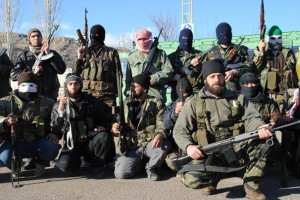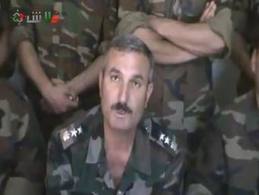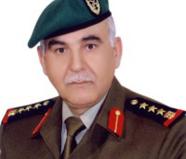 Rival dissident army officers are claiming to lead the increasingly armed rebellion within Syria, exposing rifts within the opposition.
Rival dissident army officers are claiming to lead the increasingly armed rebellion within Syria, exposing rifts within the opposition.
In an interview by telephone with CNN, Maj. Mahar Naimi introduced himself as a spokesman for the “Higher Military Council,” a newly formed organization that now claimed to lead armed defectors within Syria.
“This council represents the people fighting in Syria,” Naimi said. He added that the council was led by Gen. Mustafa Sheikh, an officer who defected from the Syrian military.
 But Naimi’s claim was quickly rejected by another defecting officer, Col. Riad al Assaad, who spent much of the last year claiming to lead a “Free Syrian Army” of rebel soldiers from a refugee camp on the Turkish border with Syria.
But Naimi’s claim was quickly rejected by another defecting officer, Col. Riad al Assaad, who spent much of the last year claiming to lead a “Free Syrian Army” of rebel soldiers from a refugee camp on the Turkish border with Syria.
“This man represents himself,” Assaad said in reference to Sheikh. “He has nothing to do with the Free Syrian Army … those people are representing themselves and do not represent the revolution and the Free Syrian Army. They don’t represent anybody.”
Assaad spoke to CNN by telephone from the Turkish border region.
“This is a conflict for leadership, which happens in all organizations and political parties,” explained a Turkish diplomat, who spoke to CNN following diplomatic protocol on condition of anonymity.
The diplomat confirmed that more than a month ago, Sheikh had come to the same refugee camp in Turkey that housed Assaad. The diplomat added that the general had tried to assume command over the colonel.
It is not clear how much command and control any of the exiled officers have over defecting troops and other armed opposition groups inside Syria.
 But another former army officer based in Istanbul told CNN neither the Higher Military Council nor Assaad’s Free Syrian Army represented a rebel faction currently battling government forces in the besieged city of Homs.
But another former army officer based in Istanbul told CNN neither the Higher Military Council nor Assaad’s Free Syrian Army represented a rebel faction currently battling government forces in the besieged city of Homs.
“We are not working under the control of the Free Syrian Army or the Higher Military Council, we are independent,” said Lt. Bassim Khaled, who claimed to represent the rebel “Al Faroukh Battalion” in Homs from his places of refuge in Istanbul.
During the more than 10 months since the uprising began in Syria, competing civilian exiles have also claimed leadership of the revolution.
Some Western diplomats working closely with opposition groups have privately expressed frustration with dissidents’ lack of unity, even as the death toll continues to rise within Syria.
“A natural reaction for people who have been brutalized for so long is depression and grandiosity,” said Andrew Tabler, author of “In the Lion’s Den” and a Syria specialist with the Washington Institute of Near East Policy.
“It is also confounded by the fact that Syria is made up of various sects and ethnicities.”
Bassem Imadi, a former Syrian ambassador who now works out of the Istanbul offices of the opposition Syrian National Council, argued that after decades of dictatorship, party politics were still a new concept for many of his countrymen.
“Look at it like [political] parties being formed for the first time right now,” he said. “One day they will come together.”
CNN

Leave a Reply
You must be logged in to post a comment.